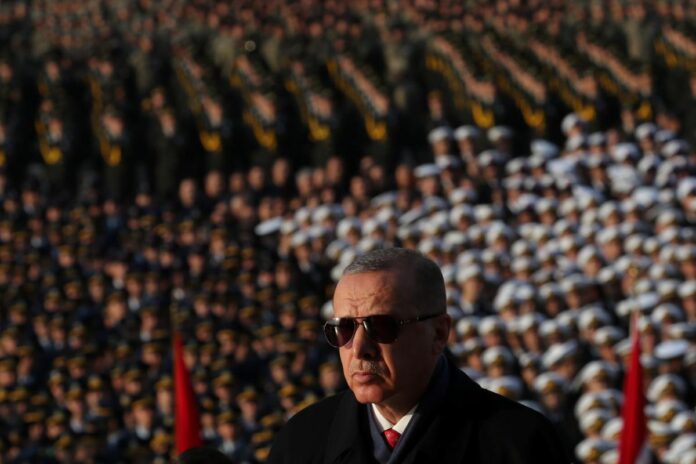Author: Aslı Aydıntaşbaş
Affiliation: The European Council on Foreign Relation (ECFR)
Organization/Publisher: Foreign Affairs
Date/Place: May 19, 2021/ USA
Type of Literature: Journal Article
Word Count: 2052
Link: https://www.foreignaffairs.com/articles/turkey/2021-05-19/turkey-will-not-return-western-fold
Keywords: Turkish Independent Foreign Policy, Recep Tayyip Erdoğan, Liberation From the West, Regional Hegemony, and International System Opportunity
Brief:
The article argues that contemporary Turkey is undergoing a deeper shift in its foreign policy, as Turkish leaders seek to achieve strategic autonomy and are keen to restore the country’s position as a hegemon regional power and a stand-alone power as it was before, or even strategically linked to the rising powers of the East, not just a nation subordinate to the West. The author starts her article by citing Huntington’s piece “The Clash of Civilizations?” (1993), in which he explicitly predicted that the nationalist and Islamic elites in Turkey would replace their pro-Western leaning secular counterparts. This is what has already happened and has become clear in recent years with the policies of AK Party and President Erdoğan. The author also believes that this trend is not related to the person of Erdoğan (who designed it by exploiting the permissive environment of the international system, especially during the international vacuum left by Trump’s withdrawal from the Middle East), rather it is related to a prevalent security culture in the country where the people/elite suspect the West and seek to achieve greater independence in the country’s foreign policy. This culture will still exist after Erdoğan. In the first part, the author discusses the balancing strategy of Turkey between the competitive global powers, as we see it today swing between the Atlantic powers of West and the rising powers of East (China and Russia in particular). This strategy has a historical background dating back to the late decades of the Ottoman Empire and the first two decades of the modern Republic of Turkey. The Turks carefully fought the game of balancing with traditional powers during the two World Wars and entered into ever-shifting alliances with the goal of maximizing benefits and investing in the great power quarrels. Today, President Erdoğan is doing the same with the competing global powers without absolute bias for one party. The goal is to achieve as much independence as possible. According to the author, Turkey sees itself as a unique nation among its neighbors destined to restore an effective regional role, the so-called “Separate Path,” an idea rooted in the perception of an heir state to the Ottoman Empire. The Turkish leadership today accordingly invokes the golden age of Ottoman history through political speeches, universities, media, and TV series in order to justify the current foreign policy and expand the Turkish military footprint to the former Ottoman lands, portraying this as “the rebirth of a sleeping giant.” The author praises the prosperity of the Turkish military-industrial complex, which has strengthened the leadership’s confidence in regional engagement, carving out spheres of influence in Iraq, Syria, and Libya and achieving remarkable victories in the battlefields, as happened in Nagorno Karabakh thanks to homemade fighter drones, as this enabled Turkey to expand its naval operations in the eastern Mediterranean and establish some military bases abroad for the first time in Qatar and Somalia. The author also attributes this to Erdoğan’s skill in exploiting the vacuum in the international system during the Trump period, in particular, and creating opportunities for playing between Russia and the United States. For example, when the Western powers did not pay attention to the Libyan government’s repeated requests for assistance following the advance of Haftar’s forces with Russian-Emirati support, Turkey paid attention to it and provided assistance. While entering into such conflicts, Turkey was carving out new spheres of influence in the era of great power competition, with the aim of obtaining a “seat at the table.” The second part of the article discusses the future of Turkish foreign policy in the post-Erdoğan era. According to her, Erdoğan is credited with being able to display power abroad well despite his country’s worsening economic situation, a situation that did not affect the large support of Turkish voters for him in his quest to restore Turkey’s prestigious status on the world stage. Turkish voters’ confidence in the West, and the US in particular, is still low. As for their desire to enter the European Union, it is due to their pragmatism. They understand that integration with Europe means a better economy and better governance. Nevertheless, there are several factors that will not guarantee Erdoğan’s victory in the 2023 elections, including “restrictions on freedom of expression” and other forms of “government repression,” as the author claims. Erdoğan’s political opponents in upcoming elections may pledge to pursue a less combative foreign policy and more stable relations with some global and regional powers. However, in the long term, Turkey’s independent foreign policy will continue with or without the current president. It is likely that Ankara will continue to assert its sovereignty and rights in the eastern Mediterranean, devote resources to develop its defense, and expand its influence in regional affairs. “Falling in line as a loyal member of the transatlantic community does not hold the appeal it once did, and it certainly cannot match the allure of projecting power on Ankara’s own terms. Turkey has claimed the role of heir to an empire, and it will pursue its separate path.”
By: Djallel Khechib, CIGA Senior Research Associate




